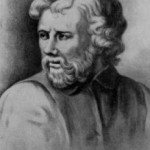
Epictetus
Epictetus was born into slavery about 55 A.D. in the eastern reaches of the Roman Empire. Once freed, he established himself as a Stoic of great influence. I digested a book of his philosophy recently entitled “The Art of Living” – Here are my favorite portions:
“First say to yourself what you would be; then do what you have to do.”
“Some things are within our control, some things are not. It is only when you learn to distinguish between what you can and can’t control that inner tranquility and outer effectiveness are possible.”
“Keep your attention entirely on what is truly your own concern, and be clear what belongs to others is their business and none of yours.”
“When something happens, the only thing in your power is your attitude toward it; you either accept it or resent it. It’s not things that disturb us, but our interpretation of their significance. They are what they are.”
“Think about it: What is really your own? The use you make of ideas, resources, and opportunities that come your way. Do you have books? Read them. Learn from them. Apply their wisdom. Do you have specialized knowledge? Put it to its full and good use. Do you have a good idea? Follow up and follow through on it. Make the most of what you’ve got, what is actually yours.”
“From this instant on, vow to stop disappointing yourself. Separate yourself from the mob. Decide to be extraordinary and do what you need to do–now.”
The Art of Living
by Mark Matteson on January 19, 2011 in Commentary
Epictetus
“First say to yourself what you would be; then do what you have to do.”
“Some things are within our control, some things are not. It is only when you learn to distinguish between what you can and can’t control that inner tranquility and outer effectiveness are possible.”
“Keep your attention entirely on what is truly your own concern, and be clear what belongs to others is their business and none of yours.”
“When something happens, the only thing in your power is your attitude toward it; you either accept it or resent it. It’s not things that disturb us, but our interpretation of their significance. They are what they are.”
“Think about it: What is really your own? The use you make of ideas, resources, and opportunities that come your way. Do you have books? Read them. Learn from them. Apply their wisdom. Do you have specialized knowledge? Put it to its full and good use. Do you have a good idea? Follow up and follow through on it. Make the most of what you’ve got, what is actually yours.”
“From this instant on, vow to stop disappointing yourself. Separate yourself from the mob. Decide to be extraordinary and do what you need to do–now.”
Tags: Epictetus, The Art of Living